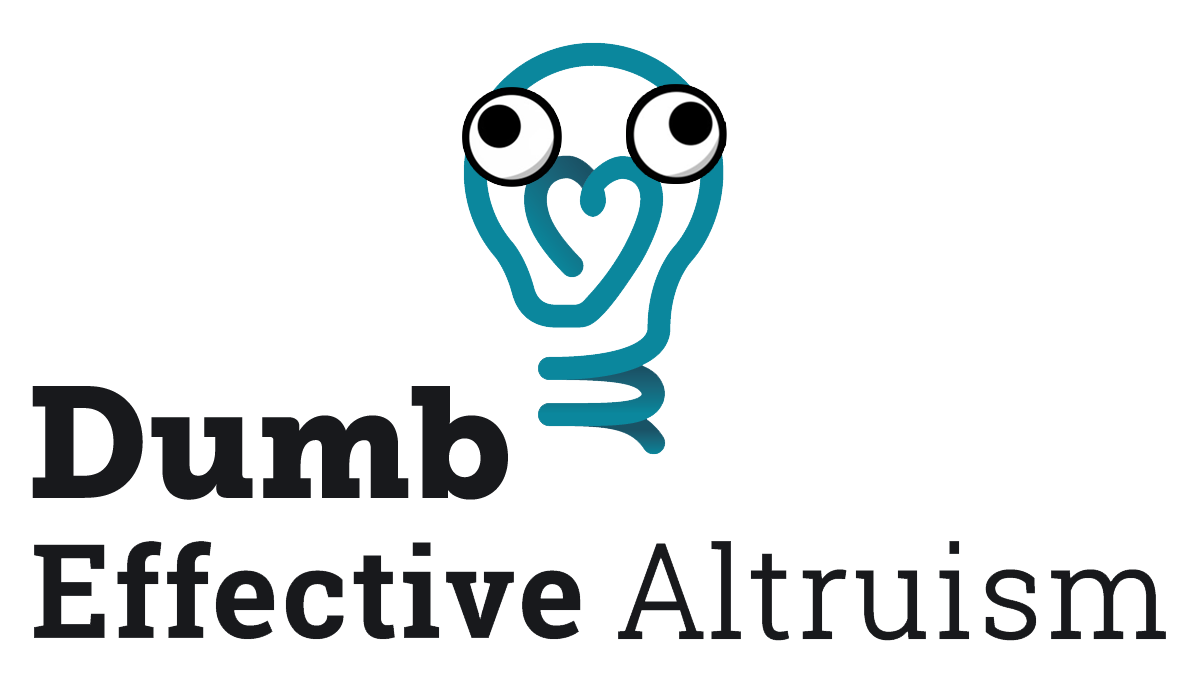My 2022 Year-End Giving Summary, and the Exciting New Philosophy of Dumb Effective Altruism

In 2019, after years of considering the possibility, I started donating 10% of my income to charity. At the time, I found writing about this quite embarrassing, and always worried that it would seem like I was bragging, or that I was on my way to being the kind of person who has a building named after themselves. But I pushed myself to do it anyway, on the off chance I might influence others to do something similar. Morality is socially contagious, so it’s important to talk about the beliefs you want to spread. (Besides, I realized that making this a part of my public identity would be a good way to hold myself accountable.)
Every December, I also started publishing a summary of where I’d donated during the year and how my giving philosophy had evolved since the previous year’s summary (here they are for 2021 and 2020). Now, in my third year of writing about this, I’ve become so much less embarrassed about this whole thing that I’ve even gone so far as to give my philosophy a name. And that name is… wait for it… “dumb effective altruism.”

Effective altruism is the utilitarian philosophical movement that, in their own words, “aims to use evidence and reason to benefit others as much as possible.” Its adherents tend to focus on easily-quantifiable interventions like distributing malaria bed nets or making direct cash transfers to the global poor, and on long-term existential risks like pandemic prevention, asteroid deflection, and AI safety. EA has been in the news a lot lately thanks to the spectacular implosion of its highest-profile donor, FTX’s Sam Bankman-Fried, whose downfall has inspired a deluge of thinkpieces about the movement1.
There are a lot of great things about effective altruism, starting with its core premise: when you consider the fact that ~40% of charitable donations in the U.S. go either to religious institutions or higher education, it’s pretty evident that lots of people aren’t even remotely thinking about how they can do the most good with their money. EA also emphasizes how relatively easy it is for well-off people to simply do more—it was the EA-inspired Giving What We Can Pledge that first motivated me to start donating 10% of what I make.
But, like all philosophies and social movements—especially new and comparitively less-tested ones—EA has its flaws. Dumb EA (a loosely Nathan Fielder-inspired name I settled on after also considering “chill EA,” “diet EA,” and “semi-effective altruism”) is my homegrown spin on the philosophy that aims to keep the its best elements while remedying its main issues. As I see it, those issues are:
Effective altruism tends towards a hard utilitarianism that can lead to a problematic ends-justify-the-means ethos, or to too much of a focus on highly speculative long-term risks like the emergence of malicious AI.
EA thinking can lead to supposedly “rational” conclusions that just feel wrong to most people, like the idea that all arts funding is unethical while there are still people living in poverty.
EA the social movement is unappealing because it just doesn’t seem very fun, and because the vast majority of its most prominent supporters are weird nerds. (As someone who spent most of my teenage years desperately trying to make sure no one thought of me that way, this last issue feels comparatively underweighted in the overall discourse.)
Dumb EA is powered by two core insights. The first is that with all kinds of optimization, a little goes a long way. Trying to optimize the effectiveness of your donations is a good thing, but if you take it too far, you’ll either reach some really weird conclusions or drive yourself, and everyone around you, insane . The second is that if making charitable donations isn’t at least a little fun, you won’t keep doing it, and even the most perfectly-coherent ethical system is worthless if you can’t stick to it.
Here’s how dumb EA works for me: I direct the majority of my giving towards donations I think are likely to be pretty effective, usually by outsourcing my analysis to somewhere like GiveWell. For the rest, I try to still keep EA principles in mind, but I also make sure not to stress out about it too much. You can (and effective altruists often do) get into endless spirals about whether, for example, it ever makes sense to fund abortion rights in America when there are people starving to death in the developing world—no matter how bad you think an unwanted pregnancy is, it’s presumably less bad than death. But if some guy at a bar tried to argue about this with me, I wouldn’t engage him in an extended debate—I’d just tell him that this conversation topic was lame and boring and that if he didn’t change the subject, I would go find someone else to talk to. I similarly try not to waste too many mental cycles on debates like this even when “the guy at the bar” is just a voice in my head.
Here’s what dumb EA looked like in practice for me this year:
Notes on a few of these:
After GiveWell, political causes made up my second-largest chunk of donations this year. The dumb EA one-line rule for effectiveness in your political giving is, if you’ve heard of a candidate, they probably don’t need your money. (A perfect example is the millions of dollars Democratic donors wasted in the last Senate cycle on obviously-doomed candidates like Jaime Harrison and Amy McGrath.) Instead, you want to focus on lower-profile races where the marginal impact of your money might actually matter. This year, I mostly donated to down-ballot candidates for Secretary of State and other, even more obscure offices that have oversight over election mechanics, mostly in states where the Republican candidate was an election denier.
After I made a few donations to StrongMinds, which provides free talk therapy to low-income women in Africa, last year, their founder reached out to me and we ended up grabbing a drink the next time he was in New York. Turns out that for small nonprofits, the amount you need to give to make it to the “founder notices your donation” level is surprisingly small—I gave them around $1,500 last year, which isn’t nothing, but certainly isn’t an amount I thought anyone there would notice. I probably would have kept donating to them anyway, but the personal reachout sealed the deal.
Every year, I like to give a relatively small amount to one or two weird causes, under the theory of worldview diversification. This year, my weird cause was the Fish Welfare Initiative, which I think I heard about on a podcast somewhere. I find it hard to have any real empathy for fish, since they’re so | stupid | looking, but the suffering of factory-farmed fish is potentially just as bad as the suffering of factory-farmed animals, and gets an order of magnitude less attention. I figured this one struck a good balance between “intriguingly weird” and “so weird it’s almost certainly a bad use of money.”
I originally started writing about this stuff because the example you set can potentially be even more impactful than the money you give: I’m never going to donating 50% of my income, but I might be able to convince four other people in a similar income bracket to donate 10% of theirs.
So I’ll close with an explicit appeal, which I’ve previously avoided making out of fear of being obnoxious: if you’re a high-income person—and, globally speaking, you probably are—you should consider giving away more of your money. Even if you spend it all on fish welfare, you’ve almost certainly wasted money on dumber things.
A few I’ve enjoyed recently: Dylan Matthews’ How effective altruism let Sam Bankman-Fried happen, Erik Hoel's Why I am not an effective altruist, and Étienne Fortier-Dubois's The Vibes Are Off



